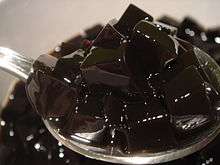Platostoma palustre
| Platostoma palustre | |
|---|---|
| Scientific classification | |
| Kingdom: | Plantae |
| (unranked): | Angiosperms |
| (unranked): | Eudicots |
| (unranked): | Asterids |
| Order: | Lamiales |
| Family: | Lamiaceae |
| Genus: | Platostoma |
| Species: | P. palustre |
| Binomial name | |
| Platostoma palustre (Blume) A.J.Paton, 1997 | |
| Synonyms[1] | |
| |
Platostoma palustre, commonly as Chinese mesona, is a species of plants belonging to the genus Platostoma of the mint family. The species grows extensively in East Asia such as south east China and Taiwan preferring ravines, grassy, dry, and sandy areas.[3] The plants are from 15–100 cm high with hairy stems and leaves. The leaves are tear-drop shaped and serrated.[3]
The plants are referred to as xiancao (仙草, 仙人草, 仙草舅, 涼粉草) in Mandarin Chinese, sian-chháu (仙草) in Taiwanese, leung fun cho (涼粉草) in Cantonese, sương sáo in Vietnamese, and หญ้าเฉาก๊วย in Thai.[2]

Use, cultivation and processing
It is primarily used in making grass jelly.[2]
P. palustre is cultivated on flat ground or areas with a slight slope. In Taiwan, this plant is often grown under fruit trees in fruits orchards as a secondary crop.[2] The plant is processed by harvesting all the aerial portions above the root. The portions are then partially dried and piled up in order to allow them to oxidize until they have darkened. After the oxidation, they are then thoroughly dried for sale.[2]
References
- ↑ Platostoma palustre (Blume) A.J.Paton. In: The Plant List (2013). Version 1.1. Published on the Internet; http://www.theplantlist.org/ [2015-7-18].
- 1 2 3 4 5 "仙草". 台北市內雙溪森林藥用植物園編輯組. "本品加水與少許鹹共同煎汁,添加少許澱粉漿可製成仙草凍,是夏天常吃的清涼飲品"
- 1 2 "Mesona chinensis in Flora of China".